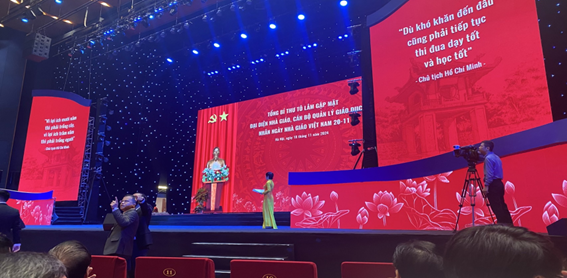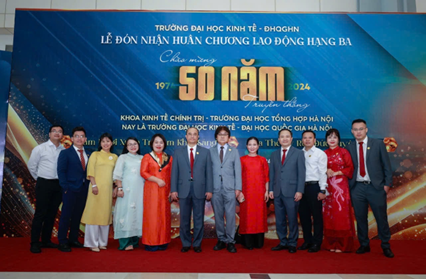2025年1月28日
Attending the 50th Anniversary Ceremony of Vietnam National University, Hanoi
Over the past three years, I have been making more frequent business trips to Vietnam. One reason is that Chiba University of Commerce has been expanding its international exchange programs with Vietnamese universities and companies, and another is that Vietnam's vitality has led to the hosting of various international conferences. In this column, I will share my impressions of attending the 50th anniversary celebrations of the University of Economics and Business (VNU-UEB) at Vietnam National University and of the meetings held with VNU-UEB for the purpose of promoting research exchange.
My first visit to Hanoi, Vietnam, was in the 1990s for a workshop organized by the Japanese Society for Artificial Intelligence, organized primarily by a Vietnamese professor at the Japan Advanced Institute of Science and Technology. At the time, most of the presentations were by Japanese researchers, and the city itself had a classic Asian feel. However, about two years ago, when I visited FPT Software, a major Vietnamese company, I discovered that the company had been sending students from its own university to Vietnamese AI researchers active around the world, resulting in numerous top-tier papers. I was deeply inspired by their dynamism since the turn of the 21st century. At the same time, like other Asian countries, the city has experienced tremendous economic growth, and its urban areas are becoming as vibrant and impressive as those in Japan.
Moving on to the ceremony itself, the first thing that struck me was the sheer scale of the event. The National Convention Center (NCC), one of Hanoi's largest facilities, was rented out for the event, and high-ranking government officials and ambassadors from various countries were invited, filling the large venue to capacity. The day before the ceremony, a large school festival was held, primarily for VNU-UEB students, which also attracted thousands of spectators. Meanwhile, the ceremony was originally scheduled for November 17, 2024, but was actually rescheduled to the morning of the 18th. This was attributed to the convenience of high-ranking government officials, but such last-minute changes are common overseas. While this change is rare in Japan, I personally found this flexible and casual approach very appealing. Perhaps we should emulate this example.

